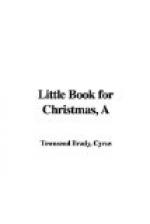“Never mind, boys,” said the drummer. “You all come along with me to the baggage car.”
So off we trooped. He opened his trunks, and spread before us such a glittering array of trash and trinkets as almost took away our breath.
“There,” he said, “look at that. We’ll just pick out the best things from the lot, and I’ll donate them all.”
“No, you don’t,” said the cow-boy. “My ante’s in on this game, an’ I’m goin’ to buy what chips I want, an’ pay fer ’em too, else there ain’t going to be no Christmas around here.”
“That’s my judgment, too,” said the cattle-man.
“I think that will be fair,” said I. “The travelling man can donate what he pleases, and we can each of us buy what we please, as well.”
I think we spent hours looking over the stock which the obliging man spread out all over the car for us. He was going home, he said, and everything was at our service. The trainmen caught the infection, too, and all hands finally went back to the coach with such a load of stuff as you never saw before. We filled the socks and two seats besides with it. The grateful mother was simply dazed.
As we all stood about, gleefully surveying our handiwork including the bulging socks, the engineer remarked:
“We’ve got to get some kind of a Christmas tree.”
So two of us ploughed off on the prairie—it had stopped snowing and was bright moon-light—and wandered around until we found a good-sized piece of sage-brush, which we brought back and solemnly installed and the woman decorated it with bunches of tissue paper from the notion stock and clean waste from the engine. We hung the train lanterns around it.
We were so excited that we actually could not sleep. The contagion of the season was strong upon us, and I know not which were the more delighted the next morning, the children or the amateur Santa Clauses, when they saw what the cow-boy called the “layout.”
Great goodness! Those children never did have, and probably never will have, such a Christmas again. And to see the thin face of that mother flush with unusual colour when we handed her one of those monstrous red plush albums which we had purchased jointly and in which we had all written our names in lieu of our photographs, and between the leaves of which the cattle-man had generously slipped a hundred dollar bill, was worth being blockaded for a dozen Christmases. Her eyes filled with tears and she fairly sobbed before us.
During the morning we had a little service in the car, in accordance with the custom of the Church, and I am sure no more heartfelt body of worshippers ever poured forth their thanks for the Incarnation than those men, that woman, and the little children. The woman sang “Jesus Lover of my Soul” from memory in her poor little voice and that small but reverent congregation—cow-boy, drummer, cattle-man, trainmen, and parson—solemnly joined in.




